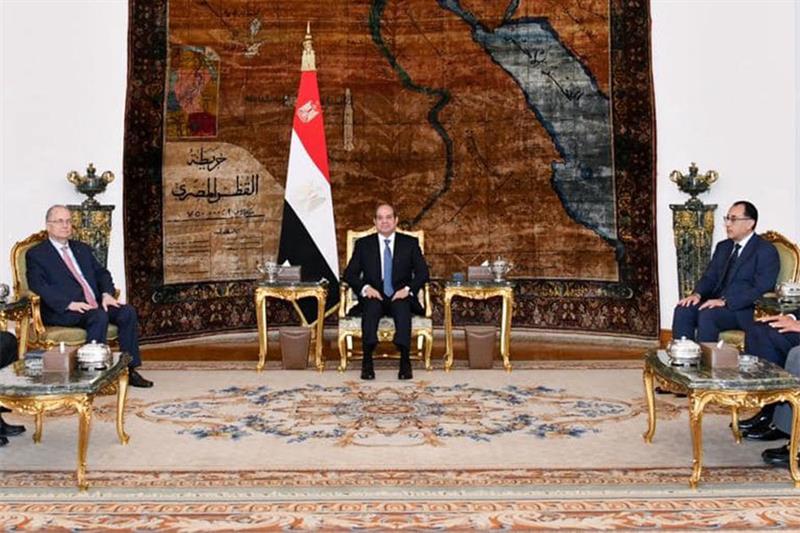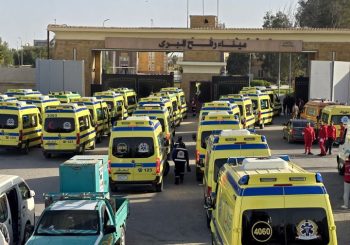Egyptian President Abdel Fattah Al-Sisi hosted a round of talks to discuss the latest developments in Gaza and efforts to establish a ceasefire in the Gaza Strip. Al-Sisi met with William Burns, Director of the United State’s Central Intelligence Agency (CIA) on Sunday 7 April and with Palestinian Prime Minister Mohamed Mustafa on Monday, 8 April.
During both meetings, Al-Sisi reiterated the urgent need to achieve peace in Gaza, underscoring Egypt’s efforts to exchange detainees and provide humanitarian aid to Gaza.
Presidential Spokesman Ahmed Fahmy said that the discussions on Sunday centered on highlighting the collaborative efforts between Egypt, United States, and Qatar to establish a ceasefire in the Strip.
Respectively, Al-Sisi welcomed Palestinian Prime Minister Mohamed Mustafa in his first visit to Cairo. During the meeting, the Palestinian PM applauded Egypt’s role in facilitating aid delivery to Gaza.
The delivery of humanitarian aid has been a pressing issue since the war on Gaza started.
Various human rights groups and international agencies warned about the dire situation faced by Palestinians, including children and infants, who are on the brink of famine due to restrictions on aid delivery.
The United Nations’ International Children’s Emergency Fund (UNICEF) warned that the number of children subjected to death is expected to rise sharply if the war and the barriers to humanitarian aid are not swiftly addressed.
On 27 February, Egypt, supported by UAE, Jordan, Qatar, and France conducted a series of airdrops to deliver crucial aid supplies for the first time since the Israeli war on Gaza. The Egyptian Air Force dropped 50 tons of aid, including food and medicine, across northern and central Gaza. The United States announced its plans to carry out the first military airdrop of food and supplies into Gaza on 1 March, a day fter more than 100 Palestinians were killed while queuing for aid.
The United States’ National Security Council spokesman John Kirby said that the airdrops would become a “sustained effort” adding that the airdrops will likely be “military MREs, or “meals ready-to-eat.”
The Egyptian Armed Forces also joined a global alliance to carry out airdrops of urgent humanitarian and relief aid in northern Gaza. The alliance includes air forces from Egypt, Jordan, the United States, France, the Netherlands, and Belgium.
Egypt’s airdrops of humanitarian aid, combined with the aid going through the Rafah border crossing, aim to assist in areas in Gaza that are difficult to reach by land transportation.
According to Prime Minister Mostafa Madbouly, Egypt has delivered 100,000 tons of humanitarian aid to the people of Gaza as of February, out of a total of 130,000 tons provided.
Recent War on Gaza Updates
On 25 March, the United Nations’ Security Council adopted a resolution calling for an immediate ceasefire in Gaza.
The resolution called for a ceasefire during the month of Ramadan and urged for a lasting and sustainable ceasefire in Gaza beyond the month of Ramadan and the release of all captives held in Gaza by Hamas and other groups.
The UN Security Council passed the resolution after it was approved by 14 votes to none. The United States abstained from the vote in what has been criticized by the Israeli Prime Minister Benjamin Netanyahu as a “clear retreat” from the US’ policy on Israel.
The United States has abandoned its policy in the UN today. Just a few days ago, it supported a Security Council resolution that linked a call for a ceasefire to the release of hostages…China and Russia vetoed that resolution partly because they opposed a ceasefire that was linked to the release of hostages. Yet today, Russia and China joined Algeria and others in supporting the new resolution precisely because it had no such linkage,” said the Israeli Prime Minister in a statement following the adoption of the resolution.
In response to the US’ abstention, Israel cancelled a planned visit by Israeli officials to Washington, but said that a visit by the Israeli Defense Minister, who is already in US, would go ahead.
Meanwhile, Palestine’s representative to the United Nations, Riyad Mansour, said that action by the United Nations Security Council has been long overdue.
“It has taken six months, over 100,000 Palestinians killed and maimed, two million displaced, and famine, for this council to finally demand an immediate ceasefire,” said Mansour following the resolution’s adoption,” Palestine’s representative to the United Nations, Riyad Mansour said.
The United States previously vetoed three resolutions calling for a ceasefire since the war on Gaza commenced on 7 October 2024. More than 33,667 Palestinians have been reported killed, and at least 70,457 are injured.







Comments (0)